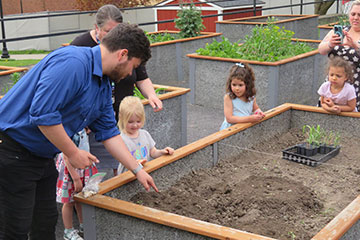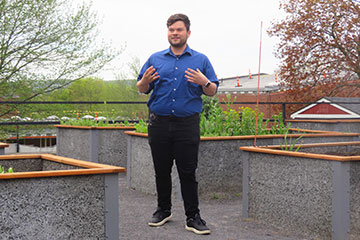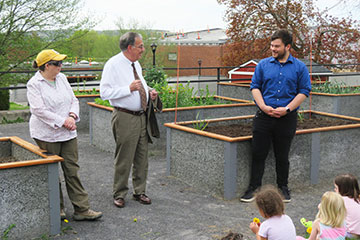
05/08/2024
When Three Sisters visited SUNY Cortland last week, it wasn’t for a regular campus visit. It was to revive a tradition that’s thousands of years old.
Ethan Tyo, a member of the Akwesasne Mohawk Nation. He visited campus to mark the start of the school’s new Three Sisters Garden, located in its Model Garden between Cornish Hall and Memorial Library.
The Three Sisters of corn, beans and squash is an agricultural tradition to the Haudenosaunee, which includes the Mohawk and nearby Onondaga nations and many other native peoples.
Students, faculty, staff and President Erik J. Bitterbaum were joined at the event by kids from the university’s Child Care Center to learn more about the Three Sisters farming method. The young helpers got to join in the experience, planting seeds that will grow through the summer months.
“My role is my passion for food,” said Tyo, who has a master’s degree in food studies from Syracuse University and is the assistant director of Native American and Indigenous student initiatives at SUNY Binghamton. “It's hanging on to what we have left, but not just hanging on — reclaiming it, restoring it and regrowing it. Knowing that we're more resilient than we have ever been before, that we have more communities helping us than ever before.”

Tyo discussed his knowledge of Indigenous food and agricultural practices. He then helped with the planting and dedication of the new garden plot.
When grown together, corn, beans, and squash each have unique qualities that aid each other’s growth to the benefit of all three crops, Tyo said. Corn draws water in for all the plants and provides protection from the wind. Squash uses its prickly leaves to keep pests away and keep moisture from evaporating. Beans act as a structural hub, supporting the corn as it grows taller and providing nutrients to the soil.
The bean and squash seeds for the garden were gifted from members of the Onondaga Nation, which lies 34 miles north of campus, while the corn kernels came courtesy of Campus Energy Manager Matt Brubaker and the campus greenhouses near Bowers Hall.
The event, supported and organized by the Sustainability Office, the Native American Studies Program and Cortland Auxiliary Services, finished the Cultural and Intellectual Climate Committee’s yearlong series on the theme of “Food."
The highlight of that series was a talk by plant scientist, MacArthur Fellow and bestselling author Robin Wall Kimmerer, whose book, Braiding Sweetgrass described the Three Sisters tradition and other indigenous approaches to agriculture.
Campus Sustainability Coordinator Beth Klein, distinguished service professor in the Childhood/Early Childhood Education Department and planner of the event with Daniel Radus, associate professor in the English Department and coordinator of the Native American Studies Program, said that the spring planting and fall harvesting of the Three Sisters Garden are planned to be annual campus events.

“It was wonderful to have Ethan with us to share more about indigenous food and agricultural practices and how we can use food to bring cultures together,” Klein said. “I am excited that this small step could develop into a healthy, sustainable partnership with members of the Haudenosaunee Confederacy.”
Tyo stressed the importance of sustainability and the seven-generation principle — believed to have originated with the Haudenosaunee — that all decisions should consider the impact they’ll have on the next seven generations.
It’s that mix of culture and agriculture that makes the new garden a valuable addition to campus, according to Radus.
“It’s important to have the Three Sisters Garden on campus because it serves as a practical reminder that the histories, cultures, and peoples of Indigenous North America remain an important and vibrant part of the intellectual and social life of our campus,” he said. “In particular, honoring and continuing a traditional form of Haudenosaunee agriculture allows our campus to reflect on how the practices of the original stewards of this land might be used today to resolve modern challenges like climate change and food insecurity.”